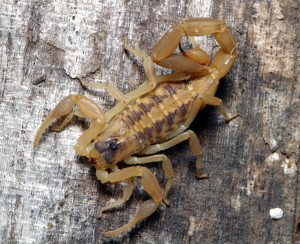
The most common Texas scorpion, the striped bark scorpion (Centruroides vittatus), has a painful sting but is not deadly.
Scorpions are one of those icons of life in Texas. It’s hard to imagine Texas without its droughts, twisters and hurricanes, floods and venomous wildlife. But when it comes to scorpions, Texas is not the riskiest place to live. Arizona and parts of New Mexico are home to the deadliest scorpion, and the target of a new antidote called Anascorp, recently approved by the FDA.
Marketed as the first antidote for scorpion stings, Anascorp, Centruroides (Scorpion) Immune F(ab’)2 (Equine) Injection, is made from the plasma of horses immunized with scorpion venom.
A sting from the Arizona bark scorpion, Centruroides sculpturatus, can cause shortness of breath, fluid buildup in the lungs, respiratory problems, blurred vision, swallowing difficulties, abnormal eye movements, walking problems, coordination difficulties, and excess saliva. Infants and children are most at risk, and should probably be the primary users of the new drug.
If you encounter a scorpion in your home, don’t panic. Place a glass or jar over the scorpion, slide a card or stiff piece of paper underneath and flip over. You can then take the scorpion outside to safer pastures, or destroy it humanely. If stung by one of our Texas scorpions, expect some pain; but unless you notice signs of an allergic reaction, symptoms should go away relatively soon. For more information about scorpions see our Scorpion factsheet E-362.